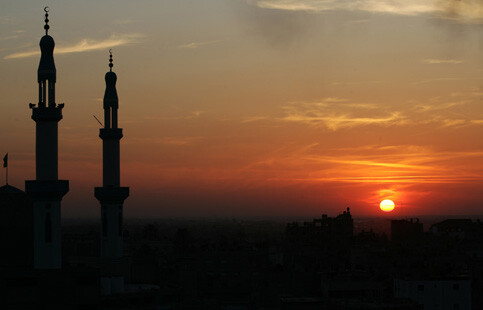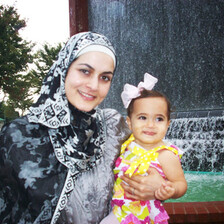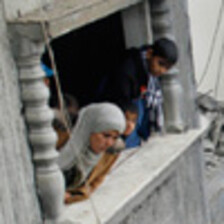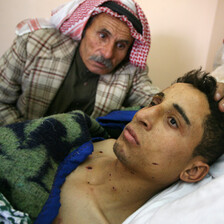Durham, United States 13 January 2009

The sun sets over Rafah refugee camp, southern Gaza Strip, 13 January 2009. (Hatem Omar/MaanImages)
I have a routine of sorts. I monitor the situation back home in Gaza all day — I keep Al Jazeera English on continuously as long as I am home, despite my son’s Yousuf’s nagging to switch to cartoons. He stopped asking several days ago, when, tearful and angry, I told him Gaza is being bombed, that Seedo and Tete (Grandma and Grandpa) are in danger.
If I leave home, I make sure my cell phone is near me at all times. Last evening, I was at my friend’s house, and my father called me, just before dawn prayers.
“Are you home? Are you there? I don’t know what’s going on but our whole house is shaking, the whole house. The windows have blown open, your mother is terrified, its horrible, I don’t now exactly where it is and the radio hasn’t broadcast anything about it yet either. Just continuous explosions all around, and these clouds of white smoke everywhere,” he went on, his words at once weary and weighed.
I rush home to turn on the TV again and see what information I can find online. He has the news before they do. Soon, Al Jazeera brings my friend Taghreed back on the line. I hear her voice and imagine her sitting next to me, trembling as she usually does in such inexplicably terrifying moments as these despite having covered Gaza for years.
“People cannot find places to stay anymore. They go from one area they were ordered to leave by the Israelis to another. And there is no more room in these United Nations schools … I refuse to call them shelters because they are not shelters. There are like one or two bathrooms for a thousand residents. I met people sleeping in the public garden of al-Shifa Hospital,” she says.
My father tells me he has seen people out on the street — entire families. That his cousin moves from Tel al-Hawa to his brother’s house nearby.
One resident in Tel al-Hawa described the evening as Israel having opened the gates of hell unto them, the shoah (holocaust) that Deputy War Minister Matan Vilnai said they would unleash unto Gaza last year.
I see a picture on my computer of a jovial Israeli soldier posing with two of his weapons with a toothy smile. I then read an article by a Haaretz journalist in the former Netzarim settlement quoting an Israeli tank commander saying he rather likes it in Gaza, because “it’s interesting” there, and other young soldiers saying they are anxious to get in on the action, to shell and snipe to death, this being their first war.
A one-year-old girl, Rula Salha, was shot to death. She was my daughter Noor’s age. I think of the smiley, war-hungry soldier. I wonder if he got his kick.
My father and I continue speaking. We learn Israeli forces have closed in on Tel al-Hawa, and navy gunships are shelling the city again. My parents speak to Yousuf for a while as I hear the explosions echoing over the speaker, and machine gun fire and the after-math of phosphorus bombs over the city on my TV.
The fear is salient, it is suffocating, it is in the air, friends say, and no one knows what’s coming next, and there is no where to turn to except up to the Heavens above.
And so many people in Gaza have taken to doing just that: they are waking up for special pre-dawn prayers qiyam al-layl in the “last third of the night,” a window of time when believers feel especially close to God and when it is said He is especially close to our calls upon Him, and supplications and prayers are most likely to be answered.
And so they tremble, and they wait, and they pray during this small window to Heaven for the gates of hell to be closed. And then it is dawn once again.
Laila El-Haddad is a Palestinian freelance journalist, photographer, and blogger (http://a-mother-from-gaza.blogspot.com/) who divides her time between Gaza and the United States.
Related Links





